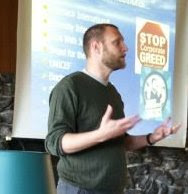To Act Rightly
Of course, my first instinct is to get hung up on the supernatural healing in the story. My scientific, postmodern mind protests and stops me from reading further. But something keeps my mind open, and I continue the story.
For the writer of Luke, and for his audience(s), the miraculous healing was not the point of the story. The Bible is chock full of miracles and healings, and there was no shortage of wonder-workers in Jesus' day. The point of the story is the protest put up by the leader of the synagogue... and Jesus' response to him.
The leader is bound by the laws, and he resists Jesus doing a good deed on the Sabbath merely because it is a deed, an act, on the day of rest. Several times in Luke and the other Gospels, Jesus has this same confrontation: religious authorities use Jesus' acting on the Sabbath as proof of his infidelity to the Law of Moses, and therefore to God. And over and over again, Jesus says in different ways that the law is meant to serve us, not we it. Here specifically, Jesus points out their own willful violations of the Sabbath stricture for small things - unyoking their ox, leading it to water. These are small acts of mercy extended to a poor, suffering creature - a gesture entirely befitting the spirit of the Sabbath: a day of rest for everyone and everything. Jesus points out these small and righteous violations of the law and asks why this poor woman deserves any less than their oxen.
The thing is, this passage is immediately followed by the parable of the mustard seed, which describes the Reign of God as starting small and growing into something large and obtrusive. Is Luke framing the narrative here? Are we to see in the pious leaders' mercy toward their animals a seed of the Kingdom? Are we to see these small acts leading to greater ones - acts that like a mustard bush will grow unruly and interfere with life the way we wanted it (orderly rows of manageable crops, for instance)? And when birds nest in its branches, is Jesus saying that these acts of disturbing mercy and compassion will lead to new priorities, unforeseen beauty, unexpected values?
Justice and mercy will be inconvenient, and the leaders will want us to curb our enthusiasm for God's Love, saying "limit what good you do." But Jesus doesn't argue with them, but points out how they themselves are already righteously disobeying the stricture, and asking them to expand their righteousness, their mercy, their love, their worship of God, to include even more people.
We have within us the seeds of the Kingdom. We just need to set ourselves free to let them grow. Free from expectations, from cultural mores, from ideas about appropriateness and what's "in." We have to be guided by love and compassion. And we may find ourselves breaking some rules in order to heal justly.
Labels: Luke



0 Comments:
Post a Comment
<< Home